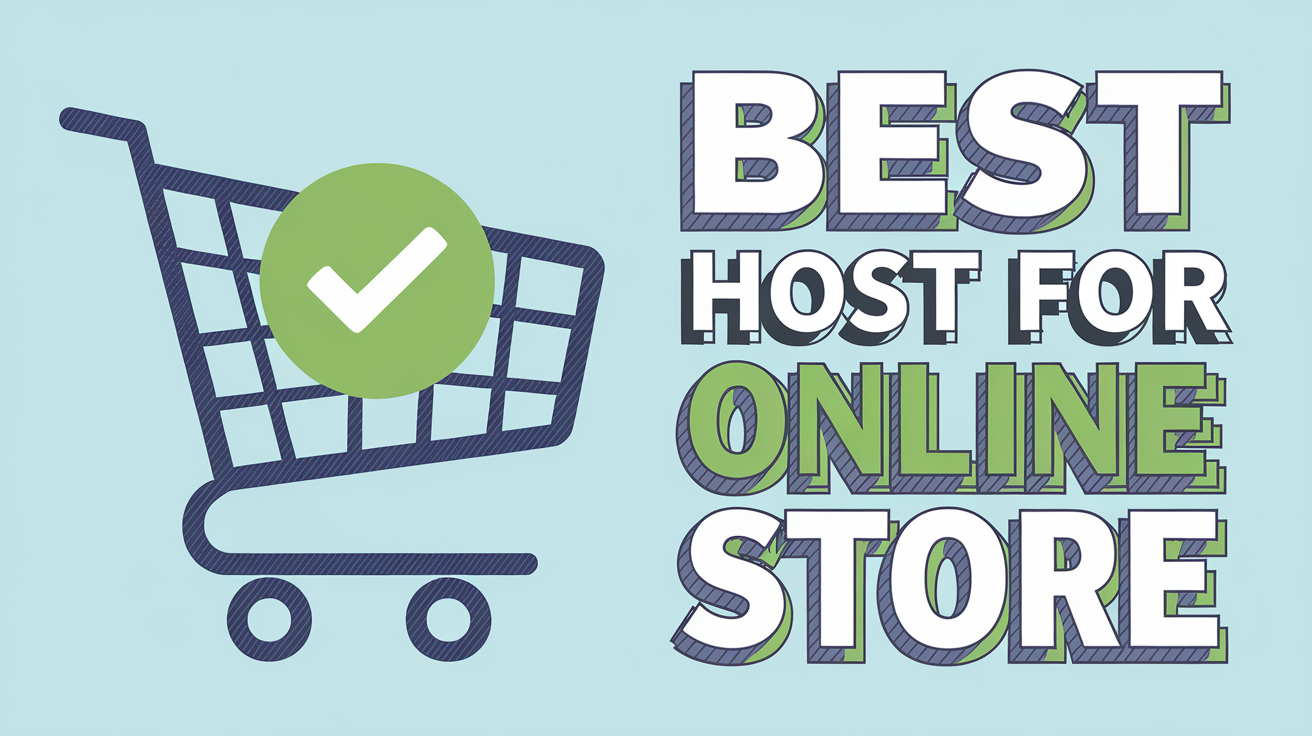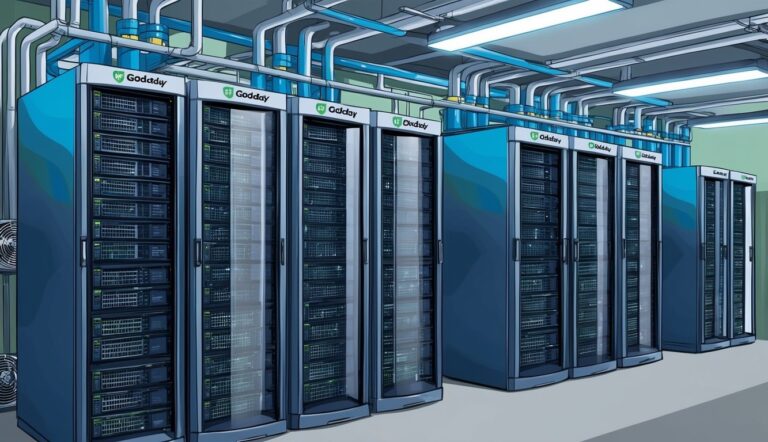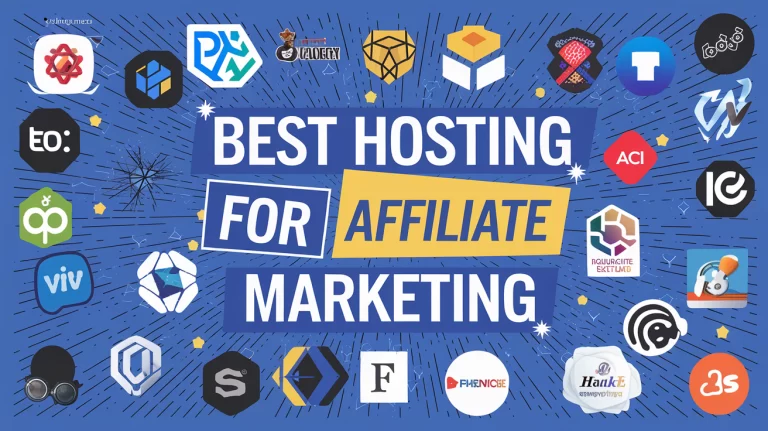Best Host for Online Store: Top Picks for E-commerce Success

Hey there! Today we’re diving into the world of online stores and the hosts that make them tick. I’ve gotta say, picking the right host for your e-commerce site is like choosing the perfect foundation for your dream house. It’s a big deal!

The best host for your online store should offer top-notch security, lightning-fast speeds, and rock-solid reliability. Trust me, I’ve seen my fair share of online shops, and these three factors can make or break your digital storefront. But don’t worry – I’m here to guide you through the maze of options and help you find that perfect match for your business. Let’s get started!
1) Shopify
I’ve gotta say, Shopify is a powerhouse when it comes to hosting online stores. It’s not just a hosting provider; it’s a full-fledged ecommerce platform that takes care of everything you need to run a successful online business.
One thing I love about Shopify is how user-friendly it is. You don’t need to be a tech wizard to set up your store. They provide all the tools you need, from product management to secure checkouts.
The best part? Shopify’s hosting is included in their plans. You don’t have to worry about finding separate hosting or dealing with technical mumbo-jumbo. It’s all taken care of for you.
Security is another big plus. Shopify is PCI compliant, which means your customers’ payment info is safe and sound. And let’s not forget about the unlimited bandwidth – no nasty surprises on your hosting bill!
Pros:
- All-in-one ecommerce solution
- User-friendly interface
- Included hosting with unlimited bandwidth
- Strong security features
Cons:
- Can be pricier than traditional hosting
- Less flexibility for non-ecommerce sites
Want to learn more? Check out Shopify’s website hosting page for all the juicy details!
2) BigCommerce
I’ve gotta tell you, BigCommerce is a powerhouse when it comes to hosting online stores. It’s not just a hosting provider; it’s a full-fledged e-commerce platform that packs a serious punch.
One thing I love about BigCommerce is its scalability. Whether you’re just starting out or running a huge operation, it’s got you covered. The platform offers a ton of built-in features that’ll make your life easier.
But here’s where it gets really cool: BigCommerce is all about flexibility. You can customize your store to your heart’s content, and they’ve got a bunch of themes to choose from if you’re not into coding.
Now, let’s talk about the backend. BigCommerce’s admin panel is pretty intuitive, even for newbies like me when I first started. It’s got all sorts of tools for inventory management, order processing, and even marketing.
Oh, and did I mention their SEO tools? They’re pretty slick. BigCommerce helps you optimize your product pages to climb those search rankings.
Pros:
- Scalable for businesses of all sizes
- Tons of built-in features
- Customizable themes
- User-friendly admin panel
- Solid SEO tools
Cons:
- Can be pricey for smaller businesses
- Learning curve for advanced features
Want to learn more? Check out BigCommerce’s features for all the nitty-gritty details!
3) Wix eCommerce
I’ve gotta say, Wix eCommerce is pretty impressive! It’s an all-in-one platform that lets you create an online store with ease. I love how user-friendly it is, even for beginners.
One thing that caught my eye is the variety of designer-made templates they offer. You can pick one and customize it to your heart’s content. It’s like having a professional designer at your fingertips!
Security is a big deal when it comes to online stores, and Wix doesn’t disappoint. They provide enterprise-grade security to keep your site safe and sound.
Now, let’s talk about pricing. Wix offers plans ranging from $0 to $159 per month. That’s quite a spread, so you can find something that fits your budget.
One cool feature I stumbled upon is their autoscale technology. It helps prevent site crashes during high traffic. Your store can handle up to 45,000 transactions per minute!
Pros:
- User-friendly interface
- Customizable templates
- Robust security features
- Scalable for high traffic
Cons:
- Limited advanced features compared to specialized platforms
- Transaction fees on lower-tier plans
Want to learn more? Check out Wix’s eCommerce website for all the details!
4) WooCommerce
I’ve gotta tell you, WooCommerce is a game-changer for online stores. It’s this awesome free plugin that turns your WordPress site into a full-fledged e-commerce powerhouse.
I love how flexible WooCommerce is. You can sell pretty much anything – physical products, digital downloads, even subscriptions. And the customization options? They’re through the roof!
One of the best things about WooCommerce is its huge ecosystem of extensions. Need a specific feature? There’s probably a plugin for that. It’s like having a buffet of e-commerce tools at your fingertips.
Setting up WooCommerce is a breeze, especially if you’re already familiar with WordPress. Even if you’re not, there are tons of tutorials and resources to help you get started.
Pros:
• Free and open-source
• Highly customizable
• Huge selection of themes and plugins
• Integrates seamlessly with WordPress
Cons:
• Can be resource-intensive on shared hosting
• Some advanced features require paid extensions
Want to learn more? Check out the official WooCommerce site for all the juicy details!
5) Squarespace
I’ve gotta say, Squarespace is pretty darn impressive for setting up an online store. It’s like the Swiss Army knife of website builders, but with a flair for e-commerce.
Their templates are sleek and modern, perfect for showcasing your products. I love how easy it is to customize them too. No coding required – just drag, drop, and boom! Your store looks pro.
One thing that really caught my eye is their all-in-one platform. You can manage your inventory, process payments, and even handle shipping right from your dashboard. Talk about convenient!
Setting up shop is a breeze. I was amazed at how quickly I could add products and connect a payment processor. It’s like they’ve thought of everything to make my life easier.
Oh, and get this – they’ve got a mobile app! I can manage my store on the go, which is perfect for us busy entrepreneurs.
Pros:
- Beautiful, customizable templates
- User-friendly interface
- All-in-one e-commerce solution
- Mobile app for on-the-go management
Cons:
- Limited payment gateway options
- Can be pricier than some competitors
Want to learn more? Check out Squarespace’s e-commerce features for all the juicy details!
6) Magento
Magento is a powerhouse when it comes to e-commerce platforms, and I’ve got to say, it’s pretty impressive. This open-source software is perfect for online stores that want to scale up big time.
One thing I love about Magento is its flexibility. You can customize it to your heart’s content, making your store truly unique. Plus, it handles multiple languages and currencies like a champ, so you can sell globally without breaking a sweat.
But here’s the kicker – Magento needs some serious hosting muscle to run smoothly. That’s why picking the right host is crucial. I’ve found that cloud hosting providers like Cloudways offer great performance for Magento stores.
Now, let’s talk about the hosting requirements. Magento is a bit of a resource hog, so you’ll want a host with plenty of RAM and processing power. Look for plans with at least 2GB RAM and 2 CPU cores to start.
Storage is another big deal. SSD storage is a must for speedy page loads. And don’t forget about bandwidth – you’ll need enough to handle all those eager shoppers.
Pros:
- Highly customizable
- Great for large-scale stores
- Supports multiple languages and currencies
Cons:
- Resource-intensive
- Can be complex for beginners
- Requires more expensive hosting
Want to learn more? Check out FounderJar’s guide on Magento hosting for some in-depth info.
7) Weebly eCommerce
I’ve got to say, Weebly eCommerce is pretty impressive for small businesses just starting out. It’s super easy to use, even if you’re not tech-savvy like me.
The eCommerce website builder lets you set up your online store in no time. You just pick a theme, add your products, and you’re good to go!
One thing I love is the mobile app. It lets me manage my store on the go, which is perfect for my busy lifestyle. I can edit products and check sales while sipping my morning coffee.
Pricing is reasonable too. It’s not as expensive as some of the big-name eCommerce platforms out there.
But it’s not all roses. The SEO features could use some work. I noticed that Weebly sites tend to load a bit slower than average, which might affect your search rankings.
Pros:
- User-friendly interface
- Mobile app for on-the-go management
- Affordable pricing
Cons:
- Limited SEO features
- Slower loading times
Want to learn more? Check out Weebly’s eCommerce features for yourself!
8) Ecwid
Let me tell you about Ecwid, folks! It’s an awesome e-commerce widget that can turn your existing website into a full-fledged online store. I’ve gotta say, I’m impressed with how easy it is to set up.
One thing I really love about Ecwid is its versatility. You can sell your products pretty much anywhere – your website, social media, even marketplaces! It’s like having a virtual shop that follows you around the internet.
Now, let’s talk features. Ecwid offers free SSL certificates for all your stores. That’s a big deal for security-conscious shoppers (which should be all of us, right?).
Oh, and get this – Ecwid has a point-of-sale (POS) system too! So if you’ve got a physical store alongside your online one, you can manage everything in one place. How cool is that?
Pros:
- Easy to integrate with existing websites
- Sell across multiple channels
- Free SSL certificates
- POS functionality
Cons:
- Limited product capacity on lower-tier plans
- Some features only available on higher-priced plans
Want to learn more? Check out Ecwid’s website for all the juicy details!
9) PrestaShop
I’ve gotta tell you, PrestaShop is a powerhouse when it comes to running an online store. It’s open-source, which means it’s free to use and customize to your heart’s content. How cool is that?
When it comes to hosting PrestaShop, you’ve got some great options. I’m talking about providers that offer one-click PrestaShop installs and 24/7 support to keep your store running smoothly. Trust me, you’ll appreciate that when you’re up at 3 AM trying to fix a glitch!
One thing I love about PrestaShop is how it plays nice with so many modules. You can integrate unlimited PrestaShop modules to add all sorts of cool features to your store. And let’s not forget about scalability – as your business grows, your hosting can grow with it.
Now, let’s break it down:
Pros:
- Free and open-source
- Tons of customization options
- Easy module integration
- Scalable for growing businesses
Cons:
- Can be complex for beginners
- Might require technical know-how for advanced features
Want to dive deeper? Check out PrestaShop’s official hosting page for more juicy details!
10) Volusion
I’ve got to tell you, Volusion is a pretty nifty e-commerce platform that’s been around since 1999. It’s packed with features to help you set up and run your online store smoothly.
One thing I really like about Volusion is its powerful inventory management system. It makes keeping track of your products a breeze, even when you’ve got a ton of items.
The platform also offers a wide range of payment gateways, including popular options like PayPal and Stripe. Plus, you can accept digital wallet payments from Amazon and Apple Pay.
I’m impressed by Volusion’s mobile app. It lets me manage my store on the go, which is super handy when I’m out and about.
Pricing is tiered based on your annual sales volume. The Personal plan starts at $26 per month for up to $50K in annual sales.
Pros:
- Robust inventory management
- Lots of payment options
- Mobile app for on-the-go management
Cons:
- Can be pricey for larger businesses
- Limited design templates
Want to learn more? Check out Volusion’s website for detailed pricing and features.
Benefits of Choosing the Best Host
Picking the right host for your online store can make a huge difference. It’s not just about keeping your site online – the best hosts offer perks that can really boost your business.
Increased Site Speed
Let me tell you, site speed is crucial for e-commerce success. A fast-loading website can seriously improve your conversion rates. I’ve seen it firsthand – customers hate waiting around.
The best hosts use solid-state drives (SSDs) and content delivery networks (CDNs) to turbocharge your site. It’s like strapping a rocket to your store!
Some hosts even offer special caching solutions. These nifty tools store parts of your site, so they load lightning-fast for repeat visitors.
I can’t stress this enough – every second counts. If your pages take too long to load, potential customers will bounce faster than you can say “sale!”
Enhanced Security Features
Now, let’s talk security. It’s a big deal, especially when you’re handling customer data and payments. The top e-commerce hosts don’t mess around when it comes to keeping your store safe.
You’ll want to look for hosts that offer:
- Free SSL certificates
- Regular malware scans
- Automated backups
- DDoS protection
These features are like a digital fortress for your store. They help protect against hackers, data breaches, and other nasty surprises.
Some hosts even throw in extra goodies like two-factor authentication. It’s an extra layer of security that can give you (and your customers) peace of mind.
Better Customer Support
Trust me, when something goes wrong with your store, you’ll want top-notch support. The best hosts offer 24/7 customer service through multiple channels – phone, email, and live chat.
I’ve been there – it’s 2 AM, your site’s down, and you’re panicking. That’s when having a dedicated support team really pays off.
Look for hosts with specialized e-commerce support. These folks know the ins and outs of online stores and can help you troubleshoot specific issues.
Some hosts even offer proactive monitoring. They’ll spot and fix problems before you even notice them. It’s like having a team of tech ninjas watching your back!
Key Features to Look For in a Hosting Provider
When choosing a hosting provider for your online store, there are some crucial features you’ll want to keep an eye out for. I’ve broken down the most important ones to help you make the best choice for your e-commerce needs.
Scalability Options
Let’s talk about scaling – it’s a big deal for growing businesses! You want a host that can keep up with your success. Look for providers offering easy resource upgrades. This means more storage, bandwidth, and processing power when you need it.
Some hosts offer auto-scaling. It’s pretty neat – your resources automatically adjust based on traffic. No more worrying about your site crashing during a big sale!
I also love hosts that let you start small and grow. Why pay for resources you don’t need yet? Cloud hosting is great for this. It’s flexible and you only pay for what you use.
Remember, as your store grows, so will your hosting needs. Choose a provider that makes scaling up a breeze!
Ease of Use and Management
Nobody wants to spend hours figuring out their hosting panel. Trust me, I’ve been there, and it’s not fun. That’s why user-friendly management tools are a must-have.
Look for hosts with intuitive control panels. cPanel is a popular one, but there are others too. These make it easy to manage your files, databases, and email accounts.
One-click installers are a game-changer. They let you set up popular e-commerce platforms like WooCommerce in minutes. No tech wizardry required!
Automated backups are another feature I can’t live without. They’re a lifesaver if something goes wrong. Make sure your host offers them – preferably daily.
24/7 customer support is crucial too. When you’re running an online store, issues can pop up at any time. You want help available round the clock.
Integration with eCommerce Platforms
Your hosting provider should play nice with your chosen e-commerce platform. It’s like finding the perfect dance partner – when they’re in sync, everything just flows!
Many hosts offer specialized WooCommerce hosting. This means optimized servers and helpful tools designed specifically for WooCommerce stores. It can make a big difference in performance.
Look for hosts that support other popular platforms too. Magento, Shopify, and PrestaShop are just a few examples. The more options, the better!
Some providers even offer their own e-commerce solutions. These can be great if you want an all-in-one package. Just make sure they have the features you need.
Don’t forget about SSL certificates. They’re essential for online stores. Many good hosts include them for free. It’s a must-have for keeping your customers’ data safe and secure.





